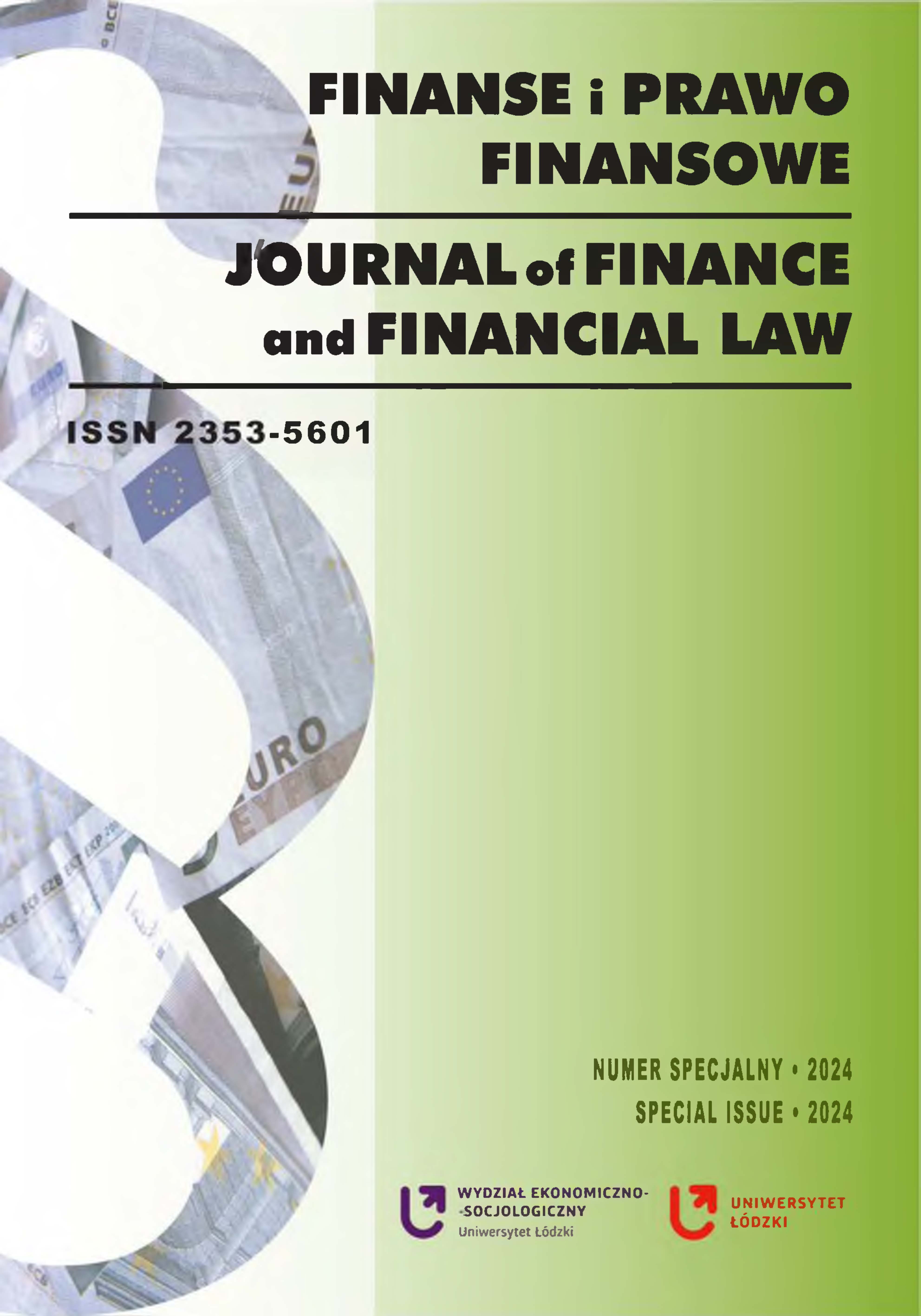Transparency of the Federal Reserve, a Force of Stability or Volatility in Financial Markets Post 2008 and Prior to COVID-19?
DOI:
https://doi.org/10.18778/2391-6478.S1.2024.02Keywords:
Federal Open Market Committee, transparency, Central Bank, monetary policy, financial markets, volatility, market efficiencyAbstract
The purpose of this article is to analyze how the Central Bank of the United States, the Federal Reserve’s decision to provide greater transparency after the Financial Crisis of 2008 impacted the volatility in financial markets. This study uses five Chicago Board Options Exchange Volatility Indices as a proxy for overall market volatility and attempts to capture their deviances from expected returns. The event dates identified are when the United States Federal Reserve met and released their “summary of economic predictions”.
The methodology deployed uses an event study framework on daily financial market data from the Federal Open Market Committee (FOMC) meeting days, to determine how an increased availability of information impacted financial markets in the period of January 2008 – January 2020.
The results of the empirical analysis do not reveal abnormal returns pre or post the event dates. This finding suggests that the FOMC announcements did not lead to significant abnormal returns of the analyzed assets.
Downloads
References
Acosta, M. (2023). A New Measure of Central Bank Transparency and Implications for the Effectiveness of Monetary Policy. International Journal of Central Banking (IJCB), 19(3), pp. 49-97.
Google Scholar
Bauer, M. D., Lakdawala, A., and Mueller, P. (2022). Market-Based Monetary Policy Uncertainty. Economic Journal, 132(644), pp. 1290-1308. https://doi.org/10.1093/ej/ueab086
Google Scholar
DOI: https://doi.org/10.1093/ej/ueab086
Blinder, A. S., Ehrmann, M., Fratzscher, M., De Haan, J. and Jansen, D. (2008). Central Bank Communication and Monetary Policy: A Survey of Theory and Evidence. Journal of Economic Literature, 46(4), pp. 910-945. https://www.doi.org/10.1257/jel.46.4.910
Google Scholar
DOI: https://doi.org/10.1257/jel.46.4.910
Boguth, O., Grégoire, V., and Martineau, C. (2019). Shaping Expectations and Coordinating Attention: The Unintended Consequences of FOMC Press Conferences. Journal of Financial & Quantitative Analysis, 54(6), pp. 2327-2353. https://doi.org/10.1017/S0022109018001357
Google Scholar
DOI: https://doi.org/10.1017/S0022109018001357
Bretscher, L., Hsu, A., Simasek, P., and Tamoni, A. (2020). COVID-19 and the Cross-Section of Equity Returns: Impact and Transmission. Review of Asset Pricing Studies, 10(4), pp. 705-741. https://doi.org/10.1093/rapstu/raaa017
Google Scholar
DOI: https://doi.org/10.1093/rapstu/raaa017
Cheng, I. (2020). Volatility Markets Underreacted to the Early Stages of the COVID-19 Pandemic. Review of Asset Pricing Studies, 10(4), pp. 635-668. https://doi.org/10.1093/rapstu/raaa010
Google Scholar
DOI: https://doi.org/10.1093/rapstu/raaa010
Ehrmann, M. and Fratzscher, M. (2007). Global financial transmission of monetary policy shocks. Oxford Bulletin of Economics and Statistics, 69(4), pp. 501-531.
Google Scholar
Chevallier, J. (2020). COVID-19 Pandemic and Financial Contagion. Journal of Risk & Financial Management, 13(12), pp. 1-25.
Google Scholar
DOI: https://doi.org/10.3390/jrfm13120309
Fama, E., Fisher, L., Jensen, M., and Roll, R. (1969). The Adjustment of Stock Price to New Information. International Economic Review, February 10(1), pp. 1-21.
Google Scholar
DOI: https://doi.org/10.2307/2525569
Gürkaynak, R. S., Sack, B., and Swanson, E. (2005). Do actions speak louder than words? The response of asset prices to monetary policy actions and statements. International Journal of Central Banking, 1(1), pp. 55-93.
Google Scholar
DOI: https://doi.org/10.2139/ssrn.633281
Lubys, J., and Panda, P. (2021). US and EU unconventional monetary policy spillover on BRICS financial markets: An event study. Empirica: Journal of European Economics, 48(2), pp. 353-371. https://doi.org/10.1007/s10663-020-09480-8
Google Scholar
DOI: https://doi.org/10.1007/s10663-020-09480-8
Makenzie, A. M., Michael R. T., and Bruce L. D. (2004). The Performance of Event Study Approaches Using Daily Commodity Futures Returns. Journal of Futures Markets, Volume 24, Issue 6, pp. 533–555.
Google Scholar
DOI: https://doi.org/10.1002/fut.10126
Rai, A., Mahata, A., Nurujjaman, M., and Prakash, O. (2020). Statistical properties of the aftershocks of stock market crashes: evidence based on the 1987 crash, 2008 financial crisis and COVID-19 pandemic. Financial Economics. https://doi.org/10.48550/arXiv.2012.03012
Google Scholar
DOI: https://doi.org/10.1142/S012918312250019X
Soper, C. C. and Sywak, M. (2019). An Increase in the Federal Minimum Wage: Good for Employees, Bad for Stockholders?. International Advances in Economic Research, 25(4), pp. 489-491. https://doi.org/10.1007/s11294-019-09751-6
Google Scholar
DOI: https://doi.org/10.1007/s11294-019-09751-6
Wang, G. (2019). The Effects of Quantitative Easing Announcements on the Mortgage Market: An Event Study Approach. International Journal of Financial Studies, 7(1), 9.
Google Scholar
DOI: https://doi.org/10.3390/ijfs7010009
(www1) https://fred.stlouisfed.org/series/EVZCLS [Accessed: 02.02.2020].
Google Scholar
(www2) https://fred.stlouisfed.org/series/GVZCLS [Accessed: 02.02.2020].
Google Scholar
(www3) https://fred.stlouisfed.org/series/OVXCLS [Accessed: 02.02.2020].
Google Scholar
(www4) https://fred.stlouisfed.org/series/VIXCLS [Accessed: 02.02.2020].
Google Scholar
(www5) https://fred.stlouisfed.org/series/VXNCLS [Accessed: 02.02.2020].
Google Scholar
(www6) https://www.federalreserve.gov/monetarypolicy/fomccalendars.htm [Accessed: 02.02.2020].
Google Scholar
Downloads
Published
How to Cite
Issue
Section
License

This work is licensed under a Creative Commons Attribution-NonCommercial-NoDerivatives 4.0 International License.














